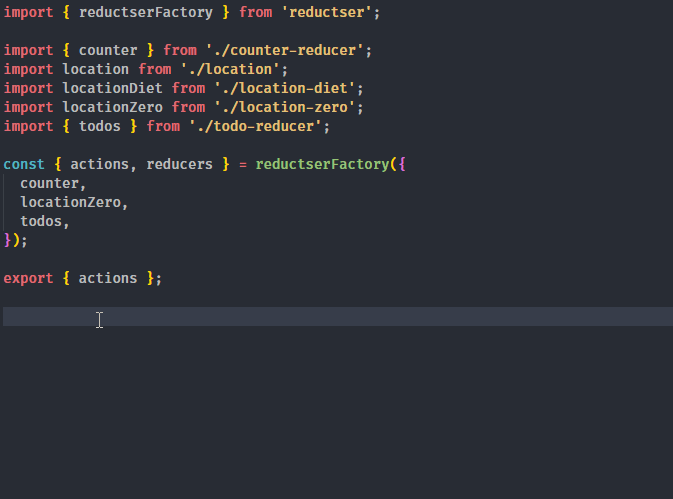reductser v0.2.1
Reductser
Redux with No Strings Attached
API Docs
You've read Erik Rasmussen's proposal, Ducks: Redux Reducer Bundles and Martin Hotell's Improved Redux type safety with TypeScript 2.8, but you're not satisfied? The amount of stringly-typed Redux code leaving a bad taste in your mouth and code smells all over your tests?
Look no further than to REDUCTSER! It's pronounced liked the famously sticky gray tape and it's just as powerful at gluing together your actions, reducers, and their behavior. Reductser can be used in a few different ways. Each with fewer strings than the last:
Reductser regular, scoping actions with an
actionFactory, which adds to each action a property that scopes the actions. All of the actiontypeproperties are generated based on their keys, and the types carry over to the reducer static type checking and completion in supporting editors.Reductser diet using the
handlerActionconstructor exclusively, the reducer becomes a simple if statement with no strings except the reducer name.Reductser zero using the
reductserconstructor, even the reducer is now scoped by its key when supplied to areductserFactory.
Here's what the the action creator type checking and code completion looks like:

Recipes
Add the reductser library to your project:
npm install --save reductserAll of these recipes start with the following import, interface, and function:
import {
actionFactory,
ActionUnion,
handlerAction,
payloadAction,
reductser,
simpleAction,
} from 'reductser';
interface LocationState {
latitude?: number;
longitude?: number;
error?: string;
}
function getInitialState(): LocationState {
return {
latitude: undefined,
longitude: undefined,
};
}Reductser Regular
Easier to work with existing reducers, Reductser handles scoping based on keys. Code completion and type checking works on these scoped actions and their payloads.
const locationActionMap = {
Clear: simpleAction(),
Set: payloadAction<{
latitude: number;
longitude: number;
}>(),
GoWest: handlerAction<LocationState, number>((state, distance): LocationState => ({
...state,
longitude: state.longitude ? state.longitude - distance : undefined,
})),
};
export const locationAction = actionFactory(locationActionMap, 'LOCATION');
type LocationAction = ActionUnion<typeof locationAction>;
export default function reducer(state = getInitialState(), action: LocationAction): LocationState {
switch (action.reducer) {
case 'LOCATION': {
switch (action.type) {
case 'Set': {
const { latitude, longitude } = action.payload;
return { ...state, latitude, longitude };
}
case 'Clear':
return { ...state, latitude: undefined, longitude: undefined };
default:
return action.handler(state);
}
}
default:
return state;
}
}Reductser Diet
Converting all of the actions to use the handlerAction constructor allows removing every string except the reducer name.
const locationActionMap = {
Clear: handlerAction<LocationState, void>(getInitialState),
Set: handlerAction<LocationState, { latitude: number; longitude: number }>(
(state, { latitude, longitude }) => ({
...state,
latitude,
longitude,
}),
),
GoWest: handlerAction<LocationState, number>((state, distance): LocationState => ({
...state,
longitude: state.longitude ? state.longitude - distance : undefined,
})),
};
export const locationAction = actionFactory(locationActionMap, 'LOCATION_DIET');
type LocationAction = ActionUnion<typeof locationAction>;
export default function reducer(state = getInitialState(), action: LocationAction): LocationState {
if (action.reducer === 'LOCATION_DIET') {
return action.handler(state);
}
return state;
}Reductser Zero
Finally, we can remove even that string by using the reductser constructor, and we get (for free!) scoped actions using the reductserFactory. (See just below in Tying it all together).
const locationActionMap = {
Clear: handlerAction<LocationState, void>(getInitialState),
Set: handlerAction<LocationState, { latitude: number; longitude: number }>(
(state, { latitude, longitude }) => ({
...state,
latitude,
longitude,
}),
),
GoWest: handlerAction<LocationState, number>((state, distance): LocationState => ({
...state,
longitude: state.longitude ? state.longitude - distance : undefined,
})),
};
export default reductser(
getInitialState,
locationActionMap,
(state, action) => action.handler(state),
);Tying it all together
The first two recipes produce regular Redux reducers and action creators, but what about this? To use a reductser with combineReducers, we use a reductserFactory. The actions key provides scoped action creators for every reductser, and the reducers key can be used with combineReducers, either as an argument or using the spread operator:
import { combineReducers } from 'redux';
import { reductserFactory } from 'reductser';
import location from './location';
import locationDiet from './location-diet';
import locationZero from './location-zero';
const { actions, reducers } = reductserFactory({
locationZero,
});
export { actions };
export const reducer = combineReducers({
location,
locationDiet,
...reducers,
});Disclaimer
No strings, despite certain strongly held beliefs about them, were harmed in the making of this library.
